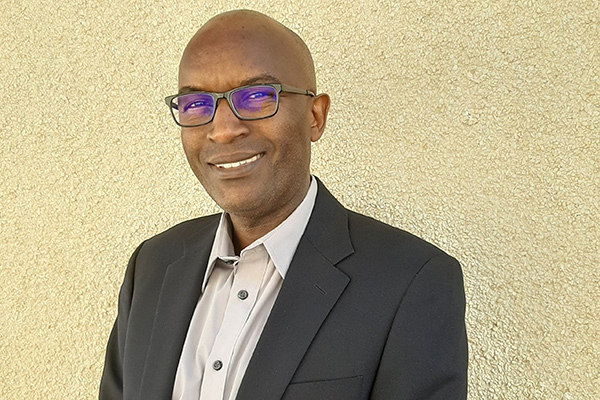Augustana professor engages students in active learning at alma mater
Giovana Bianchi - 8 February 2024

James Kariuki, professor of Chemistry at Augustana Campus (Photo: supplied).
When professor James Kariuki, PhD, received an email about the Carnegie African Diaspora Fellowship Program (CADFP), he recalled a conversation he’d had with a colleague who had shared their positive experience with the CADFP. With his sabbatical coming up, he decided to look up more details about the program requirements.
This would become the first step towards a highly rewarding experience. Now, he hopes sharing his own experience can encourage others to apply, so they can experience that same gratification.
The Program
CADFP, a scholar fellowship program for educational projects at accredited African higher education institutions, accepts applications from scholars who are African-born academics currently living in the United States or Canada and working at institutions of higher education.
Originally from Kenya, Kariuki came to Canada in 1995 to pursue a PhD in chemistry at the University of Alberta. Despite now living on a different continent, Kariuki has continued to maintain connections with his first alma mater — Kenyatta University — which happened to be one of the accredited African universities that can host a diaspora fellow to participate in the CADFP.
“I am at a stage in my career where I want to give back to society,” Kariuki says. “Hence, I strongly felt that being a Carnegie scholar at my alma mater will motivate current students during their interactions with me, a successful professor who shares a similar background with them. I intended to make the current Kenyatta University students believe that they, too, can make it to the highest level of education.”
The Application
CADFP accepts two types of proposals: a project submitted to remain in the program’s database until a matching request is received from an African host institution, or alternatively, a project submitted in collaboration with an accredited African institution (the option Kariuki pursued).
Kariuki says the application process wasn’t cumbersome: composed only of a project proposal, evidence of academic credentials and experience, a personal statement and a letter of support (Kariuki’s was from Augustana’s dean, Demetres Tryphonopoulos).
As fate sometimes has it, his first project proposal was not selected. But he did not give up. Instead, he made reference to the previously successful applications posted on the program’s website. Adding as much detail as possible – including which course he and his co-host would co-teach and further ideas for strengthening online instructional capacities — he submitted his project again. The refinement paid off: his second application was selected.
"Selecting a research partner who is willing to spend the time to prepare a strong application, and to identify the project’s goals together, was key," Kariuki says.
The Project
In collaboration with his counterpart at Kenyatta University — Mildred Nawiri, PhD — Kariuki’s project set out to redesign the existing syllabus for the online "Quality Assurance and Laboratory Management" course to increase student engagement. According to Kariuki, it is well documented in the published literature that active learning leads to better student outcomes, including critical thinking and increased course completion rates.
“We added activities such as discussion forums and instant feedback mechanisms to improve content retention,” Kariuki says. Group discussions and student presentations were also adapted to the online environment, using tools such as chat and the interactive learning software Mentimeter.
The Impact
The results of the project were gratifying. As the semester progressed, there was a noticeable increase in student participation in class activities. Additionally, the active learning techniques introduced were met with enthusiasm by the students taking the class.
Given that Kenyatta University has several satellite campuses located in smaller cities in many parts of Kenya, the project benefits should be long lasting. As a result of this project, Kariuki’s collaborating faculty member has committed to training other instructors at Kenyatta University on the best practices of online active learning.
The benefits of the project now also extend back to Augustana Campus, with Kariuki utilizing the active learning techniques he honed during his project in his in-person classes.
"The best part of the experience was the opportunity to give back to my birth country," Kariuki says. "I will always cherish the warm welcome that I was met with by both students and staff at Kenyatta University during this visit."
Future Collaborations
Although the project is officially over, Kariuki remains in contact with his counterpart – Mildred Nawiri, PhD – at Kenyatta University. Faculty interested in learning more about the program are welcome to reach out to Kariuki to learn more about his experience with the program.